What I Read This Week…
Moody’s downgrades U.S. credit rating, Google introduces AI agents that discover novel algorithms, OpenAI launches AI coding agents, and UnitedHealth Group navigates several headwinds
Watch All-In Episode 228
Watch All-In Interview with Sundar Pichai
Read our Deep Dive: A Primer on the Magnificent 7 (Part 1 - Nvidia and Tesla)
Read our Deep Dive: A Primer on Stablecoins
Read our Deep Dive: A Primer on Cryptocurrencies
Caught My Eye…
This week, Moody's Investors Service downgraded the U.S. government's long-term credit rating from Aaa to Aa1, following similar downgrades by Fitch in 2023 and S&P in 2011. Moody's ratings range from "Aaa," indicating the highest quality, down to "junk," indicating higher-risk debt. Investors trust these ratings as a standardized measure of a borrower's ability to meet financial obligations because their evaluation process is supposed to be rigorous, comprehensive, and objective. The U.S. government’s downgrade reflects rising national debt exceeding $36 trillion, driven by entitlement spending and insufficient government revenues, as well as increasing interest costs that risk consuming a larger share of federal income. Despite these concerns, the immediate market response has been calm. Investors continue to treat the U.S. Treasury bonds as secure assets because of the dollar’s role as the world’s reserve currency. To regain Moody's highest credit rating, the U.S. government would need to show credible steps toward long-term debt sustainability. This includes disciplined fiscal policies, reforms to entitlement spending, and economic growth that exceeds the rate of debt accumulation. Credit rating changes typically confirm what markets already know rather than reveal new information. This downgrade acknowledges fiscal challenges that have been building for years.
Google DeepMind introduced AlphaEvolve, an AI coding agent that uses language models to discover and optimize novel algorithms. Built on Gemini Pro and Gemini Flash, AlphaEvolve generates candidate programs, evaluates them using automated tests, and iteratively improves the best-performing solutions. It is designed for domains where progress can be measured quantitatively, such as math, hardware design, and computing infrastructure. In production, AlphaEvolve has already improved data center scheduling, contributed verified circuit rewrites to Google’s AI chips, and developed faster training processes for language models. It also achieved up to a 32.5% speedup in low-level GPU kernel optimization, a task that cannot be solved by humans. In math, AlphaEvolve proposed new matrix multiplication algorithms and advanced solutions to long-standing problems like the kissing number challenge in 11 dimensions. The system's strength lies in combining the generative power of language models with formal evaluation, allowing it to evolve complex codebases and discover novel approaches to open problems. DeepMind is preparing early access for researchers and sees potential applications in domains such as drug discovery, materials science, and sustainability, wherever solutions can be expressed algorithmically and tested automatically.
OpenAI previewed Codex, a cloud-based, AI coding agent platform capable of running many agents in parallel. Through Codex, developers can assign and monitor dozens of Codex agents, each operating in an isolated sandbox preloaded with their codebase. These agents can perform tasks such as implementing features, fixing bugs, running tests, and proposing pull requests. The system is powered by codex-1, a version of OpenAI’s o3 model that has been optimized specifically for software engineering through reinforcement learning on real-world software engineering tasks. Codex-1 demonstrates higher alignment with human coding preferences, producing cleaner patches, running tests until they pass, and following instructions with greater reliability. Codex agents are guided through AGENTS.md files, which provide instructions on how to navigate a repository and conform to project conventions. Each task produces traceable evidence of work, including terminal logs and test results, so users can audit and review the output. However, Codex is not fully autonomous yet, and human review remains essential to validate accuracy and resolve edge cases. Moreover, there are challenges such as managing overlapping file edits and ensuring consistent code quality across agents remain open areas of improvement.
UnitedHealth Group is navigating a period of operational and leadership disruption marked by rising costs, legal scrutiny, and executive turnover. In April 2025, the company reported higher-than-expected medical utilization, particularly in its Medicare Advantage segment, which caused it to miss quarterly earnings expectations for the first time in over 15 years. This was followed in May by the abrupt resignation of CEO Andrew Witty and the suspension of UnitedHealth’s full-year financial guidance, citing continued uncertainty around healthcare cost trends. Stephen Hemsley, who previously led the company from 2006 to 2017, returned as interim CEO. Meanwhile, the Department of Justice opened a criminal investigation into UnitedHealth’s Medicare billing practices, focusing on allegations that the company inflated patient diagnoses to increase federal reimbursements. These events culminated in the company’s stock falling over 50% from its recent high, bringing it to multi-year lows.
Other Reading
U.S.’s MP Material and Saudi’s Maaden Establish Value Chain for Rare Earth Magnetics (MP Magnetics)
Nvidia CEO Says Next Chip for China After H20 won't be From Hopper Series (Reuters)
Apple’s Alibaba A.I. Deal Provokes Washington’s Resistance (NYTimes)
Saudi Arabia Announces $1.5 Billion Commitment to Groq (Groq)
UPS Stands by Call to Scale Back Amazon Business (Wall Street Journal)
How Walmart Became a Tech Giant (The Economist)
OpenAI's Planned Data Center in Abu Dhabi Would be Largest in the World (TechCrunch)
ByteDance Unveils Vision-Language AI Model Rivaling Gemini Pro 2.5 (CTOL Digital Solutions)
Legal Startup Harvey AI in Talks to Raise Funding at $5 billion Valuation (Reuters)
Emergent Social Conventions and Collective Bias in Groups of LLMs (Science)
AI models Can't Tell Time or Read Calendar (Live Science)
The Rise of AI Local News (Columbia Journalism Review)
90% of Financial Institutions ‘Taking Action’ on Stablecoins (Cointelegraph)
On X…

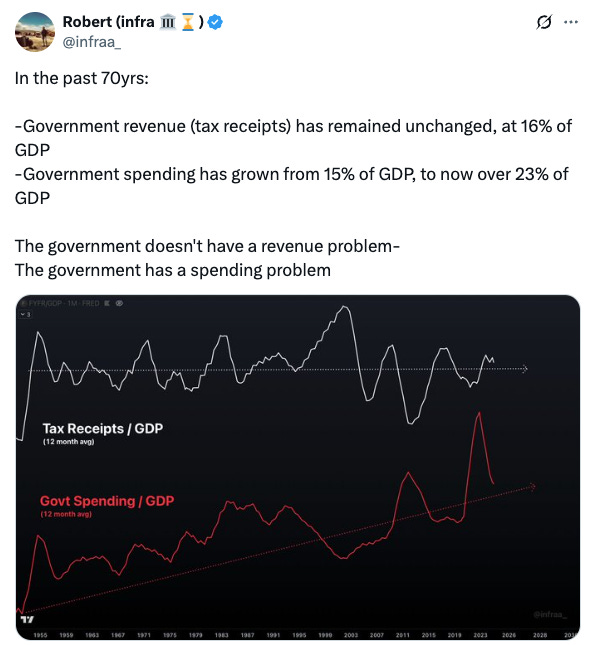
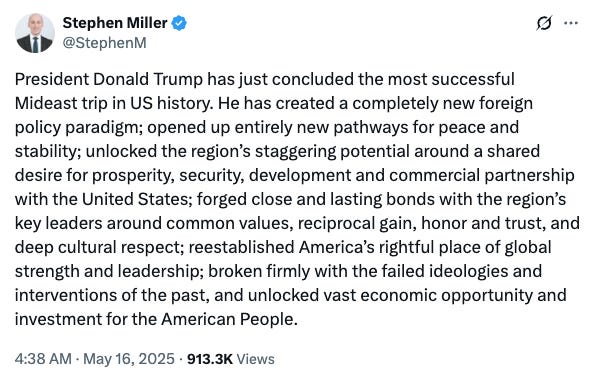


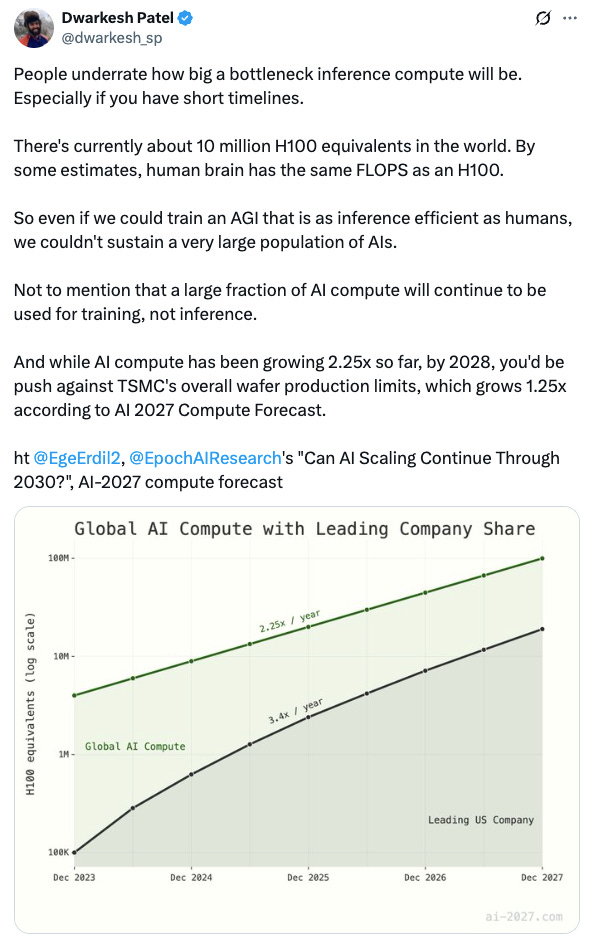
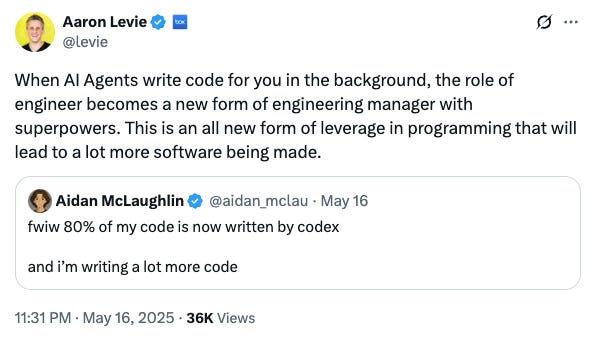
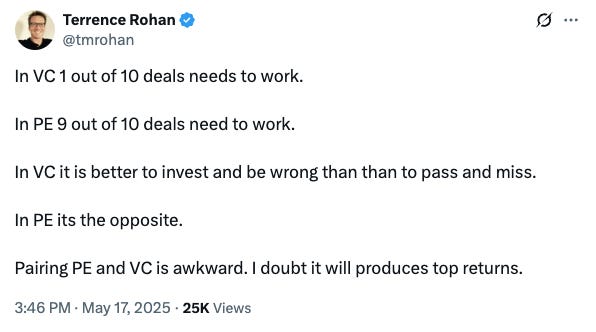
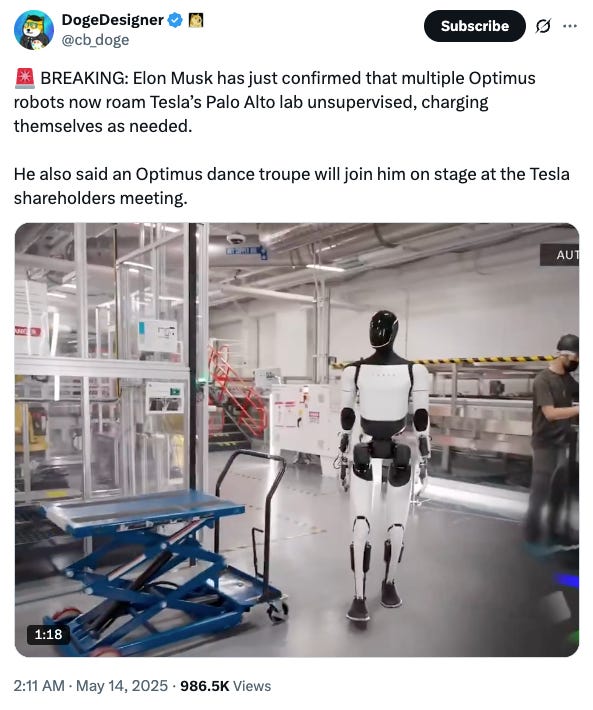
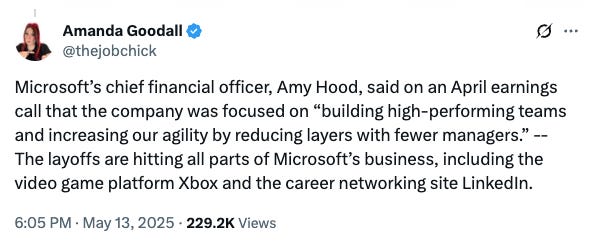
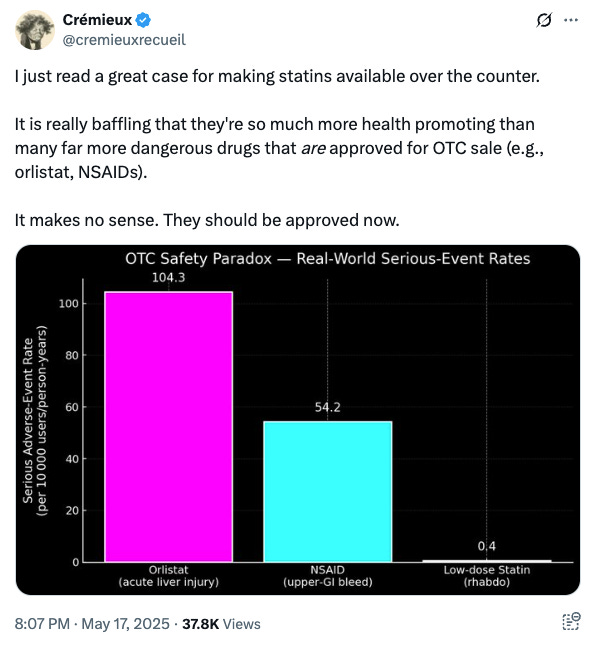
Thank you for writing this each week
Do you offer a free trial for your paid subscription? I am interested in upgrading to your paid version but would like to s=fristsee how it differs from the free version :) Thanks! Love your work